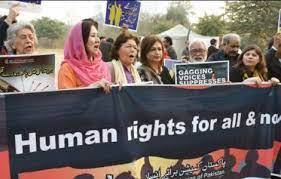
Lahore: Peoples Commission for Minorities’ Rights (PCMR) and Centre for Social Justice (CSJ), the two leading civil society organizations, have conveyed their recommendations, finalised in a consultation, to the Prime Minister Shahbaz Sharif, Speaker National Assembly, Raja Pervez Ashraf and Chairperson Standing committee on Religious Affairs, to improve the bill regarding the establishment of National Commission for Minorities Bill, 2023 introduced by the Government in National Assembly.
The office bearers and rights experts of PCMR and CSJ alluded their views to improve the draft, in a press statement. Welcoming the introduction of the bill, Patron-in-Chief PCMR Justice (R) Nasira Javaid Iqbal, emphasised the inclusion and mainstreaming of minorities. “It has the potential of instituting much needed protection of the rights of religious minorities in Pakistan. Therefore, the civil society actors have been pushing for this measure since long” she said.
The Vice Chairperson PCMR Balochistan Justice (R) Mehta Kailash Nath Kohli stated that the existing National Commission for Minorities, notified in May 2020, works under the Federal Ministry of Religious Affairs and Interfaith Harmony. It lacked a sound legal basis, independence, a proper mandate, and clearly defined functions, autonomy from the Government, powers to investigate, financial and human resources, therefore, has failed to make any progress towards protecting Minorities’ rights. “We should learn from the mistakes of the past to legislate a proper National Commission for Minorities’ Rights” he stated further.
The Executive Director of CSJ and Chairperson PCMR Peter Jacob stated that an institutional protection of minorities in Pakistan is imperative for removing embedded inequality of rights on the basis of religion as well as to raise the prospects of enforcement of rule of law and good governance. “The bill in the present form manifests some gaps, which need to be addressed to make the prospective National Commission for Minorities’ Rights truly autonomous, functional, and effective” he added.
An educationist and activist, Dr. A. H. Nayyar wished that the government would incorporate their recommendations in the bill and the entity in conformity with the UN Paris Principles relating to human rights institutions, will become a reality soon.
The 25 recommendations passed on to the Government include building parity of powers and functions with other national human rights institutions and compliance to international best practices under the Paris Principles. PCMR and CSJ also recommended the inclusion of local governments in the definition of Government to make it consistent with Article 7 of the Constitution of Pakistan, inclusion of articles, 25-A, 26, 27 and 36 to define the scope of work of the NCMR and including the existing human rights institutions NCHR, NCSW, NCRC as ex-officio members of the NCMR.
The composition should incorporate religious and provincial representation, 4 Hindus, 2 each from the upper caste and scheduled caste. The NCMR should not rule out the representation of Ahmadi community. The proposed NCMR should not indulge in service delivery or administrative functions such as protection/rehabilitation of places of worship of minorities. The participation of NCMR in international reviews shall enable the NCMR to qualify as rights institutions under UN Paris Principles. Moreover, with financial autonomy NCMR should be evolved as a human rights body and not a minorities’ parallel to toothless advisory body.
The office bearers and rights experts of PCMR and CSJ alluded their views to improve the draft, in a press statement. Welcoming the introduction of the bill, Patron-in-Chief PCMR Justice (R) Nasira Javaid Iqbal, emphasised the inclusion and mainstreaming of minorities. “It has the potential of instituting much needed protection of the rights of religious minorities in Pakistan. Therefore, the civil society actors have been pushing for this measure since long” she said.
The Vice Chairperson PCMR Balochistan Justice (R) Mehta Kailash Nath Kohli stated that the existing National Commission for Minorities, notified in May 2020, works under the Federal Ministry of Religious Affairs and Interfaith Harmony. It lacked a sound legal basis, independence, a proper mandate, and clearly defined functions, autonomy from the Government, powers to investigate, financial and human resources, therefore, has failed to make any progress towards protecting Minorities’ rights. “We should learn from the mistakes of the past to legislate a proper National Commission for Minorities’ Rights” he stated further.
The Executive Director of CSJ and Chairperson PCMR Peter Jacob stated that an institutional protection of minorities in Pakistan is imperative for removing embedded inequality of rights on the basis of religion as well as to raise the prospects of enforcement of rule of law and good governance. “The bill in the present form manifests some gaps, which need to be addressed to make the prospective National Commission for Minorities’ Rights truly autonomous, functional, and effective” he added.
An educationist and activist, Dr. A. H. Nayyar wished that the government would incorporate their recommendations in the bill and the entity in conformity with the UN Paris Principles relating to human rights institutions, will become a reality soon.
The 25 recommendations passed on to the Government include building parity of powers and functions with other national human rights institutions and compliance to international best practices under the Paris Principles. PCMR and CSJ also recommended the inclusion of local governments in the definition of Government to make it consistent with Article 7 of the Constitution of Pakistan, inclusion of articles, 25-A, 26, 27 and 36 to define the scope of work of the NCMR and including the existing human rights institutions NCHR, NCSW, NCRC as ex-officio members of the NCMR.
The composition should incorporate religious and provincial representation, 4 Hindus, 2 each from the upper caste and scheduled caste. The NCMR should not rule out the representation of Ahmadi community. The proposed NCMR should not indulge in service delivery or administrative functions such as protection/rehabilitation of places of worship of minorities. The participation of NCMR in international reviews shall enable the NCMR to qualify as rights institutions under UN Paris Principles. Moreover, with financial autonomy NCMR should be evolved as a human rights body and not a minorities’ parallel to toothless advisory body.

